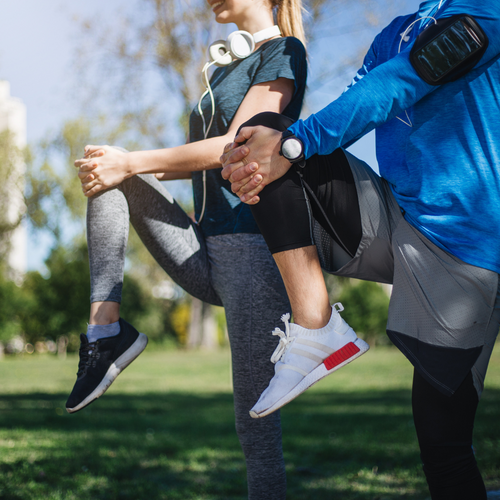Any coach or physical therapist can tell you that the difference between a so-so season and one at which you’re operating at peak performance is the care you give to recovery. Whether it’s a long run, a grueling practice, or a tough game, heavy physical activity puts a strain on your muscles, joints, and cardiovascular system.
1. “Post” Stretching is as Important as “Pre”
Static stretching is ideal for recovery. After you work out, hold your basic stretching pose for longer than you would with more dynamic, warm-up stretching routines. After you’ve extended the muscle group you’re targeting, try to hold the pose for at least 30 seconds.
In addition, using foam rollers during stretching in physical therapy or at home is an excellent recovery tool. If you’re not sure which stretches are best for recovery, a physical therapy session, targeted to aiding recovery, can help you learn some new routines.
2. Have More “Rice”
Too many athletes reserve the RICE (rest, ice, compression, elevation) for treatment for actual injuries. Yet the very act of working out causes countless micro-tears in your muscle tissue. Some or all of the RICE strategies can keep that soreness from extending into your next workout or physical therapy session.
The “rest” component is sometimes overlooked during a busy workout period, but giving muscle groups a day off is important. Elevate your arms or legs if they’re feeling sore. An ice pack is another tried-and-true recovery method, while compressing that pitching arm, or tricky ankle, in a brace or bandage can make a big difference.
3. Feed the Need
What you munch on after your workout can go a long way to maintaining peak performance. Foods high in lean protein aid muscle repair, while complex carbs restore your depleted sugar levels. Beans and rice, fish and whole-grain rolls, chicken and quinoa — all these pairings make for great protein-carb combos.
Of course, drinking plenty of water is also important. Peak performance also comes from having enough fluids in your system to keep waste buildup moving, regulate your body temperature, and keep your joints “well-oiled.”
4. Sleep It Off
Boring but true: You simply can’t maintain excellence in your athletic performance without proper rest. That’s especially true on days that you’ve put your body through its paces. Sleep promotes the recovery of your muscular-skeletal, cardio, and immunity systems.
Physical therapists agree that teens need up to 10 hours of sleep each night, while adults need at least 8 hours.
Contact Alkeme Sports RX today and speak with our experts!
Reference Links:
- http://www.moveforwardpt.com/Resources/Detail/tips-to-recover-from-workout
- https://www.health.harvard.edu/staying-healthy/six-tips-for-safe-strength-training
- https://blog.voltathletics.com/home/2017/8/16/4-recovery-tips-for-optimal-performance
- https://www.mensfitness.com/training/the-6-best-ways-to-recover-from-your-workout

